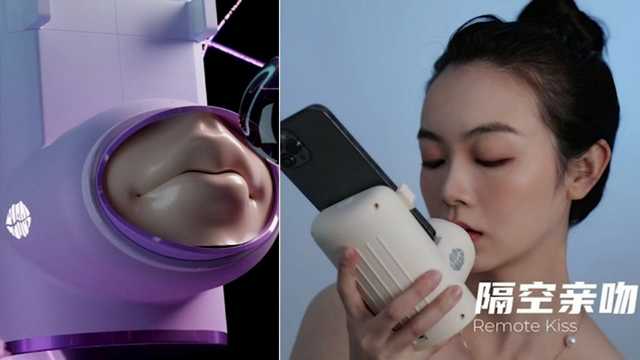
Are you in a long-distant relationship? If yes, you can be sure that technology has you in mind. Even if you are not in one, you would still be surprised about this new Chinese device that enables partners to send kisses.
A University in the Jiangsu province in East China has partnered with the Changzhou Vocational Institute of Mechatronic Technology to design a device that enables partners to virtually share kisses, even if they are far from each other. The device is so advanced that kissing is almost equivalent to a real-life kiss.
How the device works
The kissing device is first of all paired with a mobile app and plugged into the phone’s charging port. Once it is connected, the couples can “upload” their kisses on the app by literally kissing the mouth-shaped module in the device. The kiss is then transferred to the receiver’s end, who in turn receives the kiss by connecting the device and following the same process.
The “lips” on the device are made from silicon and can capture the exact pressure, movement, heat, and even the sound made during kissing and transfer the same to the receiver’s device. What that means is that the receiver could get the same feeling as a real kiss. People could also kiss anonymously using the device.
A creation of a long-distant relationship
Jiang Zhongli is the brain behind this new device that connects couples that are far away from each other. How did the innovation come about and what triggered the thought of making this weird device? Jiang has this to say.
“In my university, I was in a long-distance relationship with my girlfriend so we only contact with each other through phone. That’s where the inspiration of this device originated,” Jiang Zhongli told Global times.
Jiang, a graduate of the University, said he was surprised that the device got the attention it got and hoped that someone would be interested in collaborating with him to expand and perfect the device. Jiang enjoyed a patent right to the device from 2019 to January 2023.
How much it costs
The small device is affordable for most people. Users can buy an individual lip or buy a pair of it. An individual lip cost about 260 yuan ($38) each and the pair cost about 550 yuan ($79). China’s largest online shop, Taobao, is currently selling the device and at least 100 lips are sold every month.
One device, different reactions
The innovation has surprised many people that heard about it. While some feel it is yet to perfectly mimic the human-to-human kiss, others feel kissing online is weird, while others find it funny.
“I feel there are a lot of options not available yet: the tongue, the teeth, the moisture, the breath, among potentially many other important requirements of the human application,” one Twitter user reacted.
“What’s next to do remotely…?” another user asked.
“This is super weird,” yet another user said.
“Expect a lot of pivoting for this kind of product. It will open many opportunities to feel things as they happen live. From live-streaming to live-feeling,” another user wrote.
The Chinese kissing device is not the first such technology. In 2016, a Malaysian company invented “Kissinger,” which served the same purpose. However, the Chinese product could better transmit a kiss than Kissinger because of the realistic-looking lips.
While writing reviews on the product, one user said: “My partner didn’t believe that (remote) kissing could be achieved at first, so her jaw dropped when she used it.”
“This is the best surprise I have given her during our long-distance relationship,” the user added. “Thank you technology.”






Yea, I thought of this looooonny time lol 😆 😂 😅
Why they don’t use their knowledge and skills to create something more useful? So when you put your mouth on this apps to bec sick. Please!!